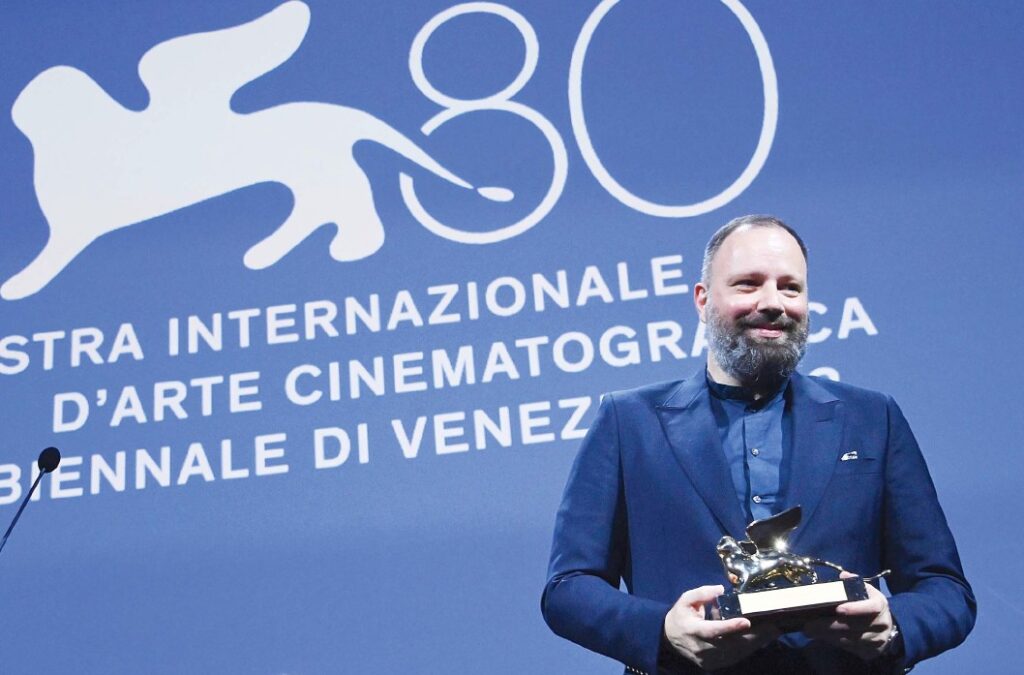10/09/2023
10/09/2023
2 films shaming Europe for its migration policies bag awards
ROME, Sept 10, (AP): “Poor Things,” a film about Victorian-era female empowerment, won the Golden Lion on Saturday at a Venice Film Festival largely deprived of Hollywood glamour because of the writers and actors strikes. The film, starring Emma Stone, won the top prize at the 80th edition of the festival, which is often a predictor of Oscar glory.

Receiving the award, director Yorgos Lanthimos said the film wouldn’t exist without Stone, who was also a producer but was not on the Lido for the festival. “This film is her, in front and behind the camera,” Lanthimos said. The film, based on Alasdair Gray’s 1992 novel of the same name, tells the tale of Bella Baxter, who is brought back to life by a scientist and, after a whirlwind learning curve, runs off with a sleazy lawyer and embarks on a series of adventures devoid of the societal judgements of the era. Other top winners on the Lido were two films shaming Europe for its migration policies. “Io Capitano,” (Me Captain) by Matteo Garrone, won the award for best director while Garrone’s young star, Seydou Sarr, won the award for best young actor.
The film tells the story of two young boys’ odyssey from Dakar, Senegal, to the detention camps in Libya and finally across the Mediterranean to Europe. Agnieszka Holland’s “Green Border,” about Europe’s other migration crisis on the Polish-Belarus border, won the Special Jury Prize. “People are still hiding in forests, deprived of their dignity, of their human rights, of their safety, and some of them will lose their lives here in Europe,” Holland told the audience. “Not because we don’t have the resources to help them but because we don’t want to.” Peter Sarsgaard won best actor for “Memory,” in which he co-stars with Jessica Chastain in a film about high schoolers reuniting. In his acceptance speech, Sarsgaard referred to the strike and artificial intelligence and the threat it poses to the industry and beyond.
Connection
“I think we could all really agree that an actor is a person and that a writer is a person. But it seems that we can’t,” he said. “And that’s terrifying because this work we do is about connection. And without that, this animated space between us, this sacrament, this holy experience of being human, will be handed over to the machines and the eight billionaires that own them.” Cailee Spaeny won best actress for “Priscilla,” Sofia Coppola’s portrait of the private side of Priscilla and Elvis Presley. The jury was headed by Damien Chazelle and included Saleh Bakri, Jane Campion, Mia Hansen-Løve, Gabriele Mainetti, Martin McDonagh, Santiago Mitre, Laura Poitras and Shu Qi.
Meanwhile, film director Agnieszka Holland demanded an apology from Poland’s justice minister after he compared her latest film, which explores the migration crisis at the Poland-Belarus border, to Nazi propaganda. Holland said Wednesday that she planned to bring defamation charges against Justice Minister Zbigniew Ziobro unless she receives an apology within seven days. She also demanded that he make a charitable donation of 50,000 Polish zlotys ($11,600) to an association that helps Holocaust survivors. Holland’s feature film, “Green Border,” explores a migration crisis that has played out along Poland’s border with Belarus over the past two years. It takes a sympathetic approach toward the migrants from the Middle East and Africa who got caught up as pawns in a geopolitical standoff. It also looks critically at the way Poland’s security services pushed back migrants who were lured to the border by Belarus, an ally of Russia.
Ziobro slammed the film earlier this week, saying: “In the Third Reich, the Germans produced propaganda films showing Poles as bandits and murderers. Today, they have Agnieszka Holland for that.” He made his comment on the social platform X, formerly Twitter, on Monday, a day before the film had its world premiere at the Venice Film Festival. Holland noted in a statement that Ziobro, who serves as prosecutor general as well as justice minster, commented on her film without having seen it and that she believed his words amounted to defamation, calling them “despicable.” “I cannot remain indifferent to such an open and brutal attack by a person who holds the very important constitutional position of minister of justice and prosecutor general in Poland,” she wrote in a statement from Venice dated Wednesday but published in Poland on Thursday. Holland said the comparison to Nazi propaganda was offensive because of what Poland suffered under Nazi occupation during World War II and given her own background. She noted that she was both the daughter of a liaison in the Warsaw Uprising, the city’s 1944 revolt against the occupying Nazi German forces, and the granddaughter of Holocaust victims.


